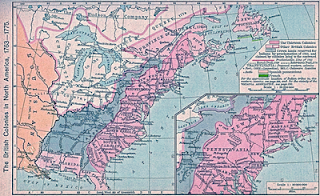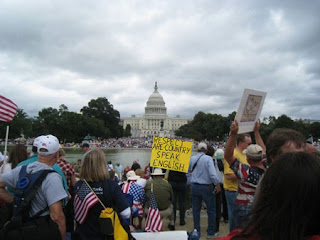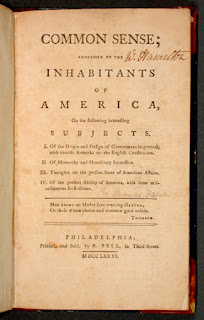Nothing could be further from the truth. Look, it's really easy and popular to oppose taxes because nobody likes paying them. But if we don't, we have to give up roads, bridges, the Internet, trash hauling, police, the military a navy, public storm shelters, interconnected trains that bring us goods, airports, air traffic control, harbors, international relations with trade partners, Indian casinos instead of Indian wars, schools, universities, a banking system, fair trade, and so on. Stuff we all take for granted.
There were conservatives active in our Revolution. They were called "Loyalists." They were relocated to Canada or left to England after the signing of the Treaty of Paris, signed on September 3, 1783 which ended hostilities. In fact, England ended hostilities because the liberals (known as Whigs) took over Parliament and decided peace was more important than trying to beat the American Colonists into submission in a war that had become very unpopular in England.
But that was England. The issue in America was not taxation, in and of itself. It was lack of any representative in Parliament that could argue the Colonists' side or represent the interests of colonial people. In fact, the Continental Congress asked Benjamin Franklin to travel to England to represent our interests to Members of Parliament (since we had no direct representation).
The whole idea of a Parliament is a liberal ideal. The conservatives believed in the Divine Right of Kings—if you were born a prince, you had a right to rule. Here in the American colonies we had, of necessity, been self-governing since being dropped off here in the colonial establishments. Communication with England could entail a three-month trip. The idea of a "right to rule" kind of got fuzzy here, as we didn't have any established monarch on these shores, and many of the wealthy landowners who had been given grants here by the King were absentee—they lived in England.
 |
| The Continental Congress Voting Independence |
Much of our Constitution (and, if you consider the Articles of Confederation a constitution, this was our second) was a reaction to England. We didn't like how Parliament governed. We didn't like how non-representative it was, with some constituencies very small, others very large, some constituencies populous, others not. So we decided that representation would be apportioned in accordance with population, counted in a census every 10 years. That was very liberal, and it was almost unheard of. It flew in the face of the governance of the Princes of Europe, who set boundaries based on what the nobility had done for them and this patronage system was their system of representation. If you were "in favor," you were better represented. "Out-of favor" meant scant little.
And the forming of a Republic was considered impossible. This was a way radical liberal ideal to form a republic, where the masses would all have a say in governance. So some conservatives (who were very liberal as compared to Europe) thought that it would be better to have representation of the States interests. So the bicameral legislative bodies were set up, with the States choosing their Senators and the masses choosing their Representatives.
 |
| Lincoln knew that the princes of Europe wished to destroy our Republic |
You get confirmation of that with Lincoln, the first Republican President. He affirmed that there could be no breakup of the United States, as he knew that the princes of Europe would just as soon carve up this country and all of its resources in order to create their own little (actually big) fiefdoms here. At the time of Lincoln, "four score and seven years ago," the idea of a representative Republic was a totally liberal idea. The Conservatives went with princes, kings, kingdoms, empires and colonial systems.
The neo-conservatives of today have no claim on the American Revolution or on our Constitution—both extremely liberal, progressive ideals.
Now, I have been told that I'm trying to assign the tenets of today's Liberal and Conservative movements to those of the 1700s. This is not true, either. This is not apples and oranges.
The neo-conservative movement is all about "lowering the burdens of full participation in society for the 'job creators'" which are defined as the wealthy. By lowering the burdens, they mean reducing taxes, omitting regulation so that they may conduct business unhampered by any governmental paperwork, restriction or interference and by allowing businessmen to call the shots.
Sounds great. After all, we would never have had any revolution had it not been for the big corporations encouraging us to… Wait!
 |
| After the Seven-Years War, King George III ceded all land west of the Eastern Mountains to the Indians |
The Colonials read the treaty and decided they didn't like it. And I think the treaty made across the Atlantic by people who didn't live here was an additional concern with respect to the lack of representation in Parliament for the Colonials. Certainly young George Washington had familiarized himself, as a surveyor, with the lands in the west over the mountains and one result of our Revolution was that he was able to use land acquired in those western territories, which King George III had, with his signature, given in perpetuity to the Indians and withheld from the Colonials. And all this without one representative in Parliament to make the point that the European colonists might, actually beg to differ.
Would having had a representative in Parliament have changed anything? Probably not, but there would have been at least one voice of concern raised in our favor.
Additionally, our Revolution freed us from the yoke of the English Royal Chartered Companies that were set up by the King to make money for the wealthiest—in England, not here in America. These were truly the first transnational companies. And they were empowered to do things that we assume only governments do, such as:
- Trade with the indigenous peoples
- Form banks
- Own, manage and grant or distribute land
- Raise its own police force
| The Seal of the Virginia Company of London, known as the London Company |
These were Royal monopolies and served, in effect to enrich the "job creators" of their day through the restraint of trade and strict control over the Colonists. As I have mentioned, these chartered companies were truly transnational in scope, as colonists were not allowed to trade directly with anyone, save through these companies. To the extent Jefferson's tobacco found its way to France, it was only through the London Company.
Liberals wanted free trade, allowing American farmers the ability to trade directly with anyone, and this was another result of our Revolution: No longer were we held in the thrall of the oligarchs who were the beneficiaries of these transnationals.
Today's neo-conservative movement still adheres to this principle that large transnational companies
 |
| TEA Party rally. Their claims to adherence to the principles of the American Revolution are utterly false. |
As you can see, I am really bothered by this claim that the American Revolution was some kind of a conservative movement. In all levels of society, in all ways of doing business of limiting upward mobility and of controlling the people, the conservative movement wants to roll us right back to the "royal excesses" of the pre-Revolutionary era. The founders of this country did not set up a nation based on Christianity. They were not rebelling against taxes—indeed, they instituted their own but made sure that there was representation of all views.
And I'm not bothered by the rhetoric because I disagree with the political aims of the TEA Party. I am bothered because their claim is utterly false, devoid of fact and a pack of lies.
Just like the whopper about how if a woman is raped, her body shuts down the conception thing. But that's another article.
